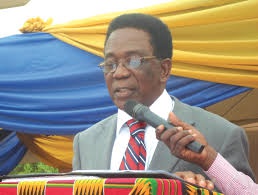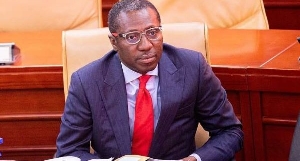General News of Monday, 13 November 2017
Source: ghananewsagency.org
Technical Universities urged to design industry specific courses
 Professor Kwesi Yankah, Minister of State in charge of Tertiary Education
Professor Kwesi Yankah, Minister of State in charge of Tertiary Education
Technical Universities have been tasked to seek opportunities to help introduce additional technical and technology-based programmes that are industry specific and relevant to the changing trend of technology.
This would not only consolidate their core mandate of providing quality higher technical and vocational education, but also facilitate their contribution towards national development.
Prof Kwesi Yankah, Minister of State in charge of Tertiary Education, made the appeal in a speech read on his behalf at the 13th congregation of the Cape Coast Technical University (CCTU) at the weekend.
In the speech read by Dr Fred Asamoah, Acting Executive Director of Council for Technical and Vocational Education and Training (COTVET), the Minister suggested that programmes like Bachelor of Technology in Oil and Gas in Transport Management should be introduced.
He said training the youth in industry specific skills would not warrant employment of expatriates to handle such positions in the country
A total of 1,126 graduands made up of 50 Bachelor of Technology,942 Higher National Diploma,63 professional and 71 Diploma certificate students who pursued programmes in Engineering, Applied Science and Arts and Business, and Management studies graduated.
The Minister encouraged the research departments of Technical Universities to ensure regular collaboration with industry and tailor their research activities towards seeking practical solutions to address societal challenges.
Prof Yankah further admonished technical universities to stick to their core mandates and desist from running programmes that have no bearing on their foundation.
He said the conversion of polytechnics into Technical Universities did not give them the impetus to deviate from their focal point but to better position them to provide quality higher technical and vocational education.
He said the law that established them tasked them to provide higher education in engineering and science and technology based disciplines as well as technical and vocation training to fill the needed manpower of the country.
The Minister said Government would not relent in its efforts to supply the universities with the needed infrastructure and human resources to enable them perform their roles efficiently and effectively.
The Vice Chancellor of CCTU, Professor Lawrence Atepor, said in pursuit of its mandate, the University had signed a partnership agreement with Kumasi Technical University and three other Universities of applied sciences to improve teaching and learning.
The collaboration, he said involved tailored curriculum and other training programmes to the needs of industry aimed at reducing the skills gap of students to the barest minimum.
Prof Atepor appealed to the Government to adequately resource the University’s laboratories and workshops with modern equipment to enable the students have more practical experience.
Mr Francis Albert Seth Nyonyo, a Council of State Member, challenged technical universities to play a major role in ensuring the success of the “one district, one factory” policy by training students to provide technical support to the factories.












